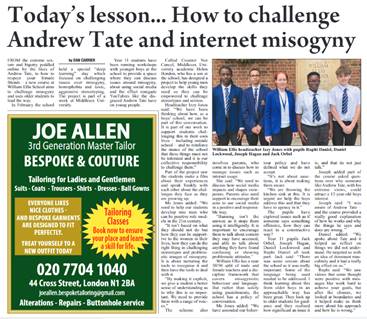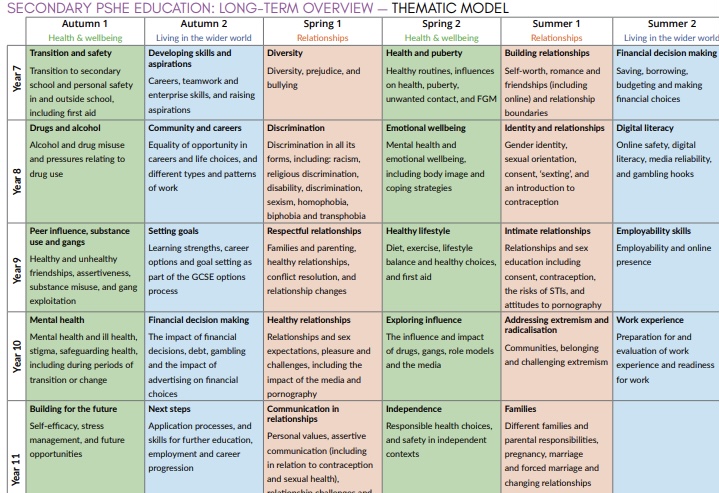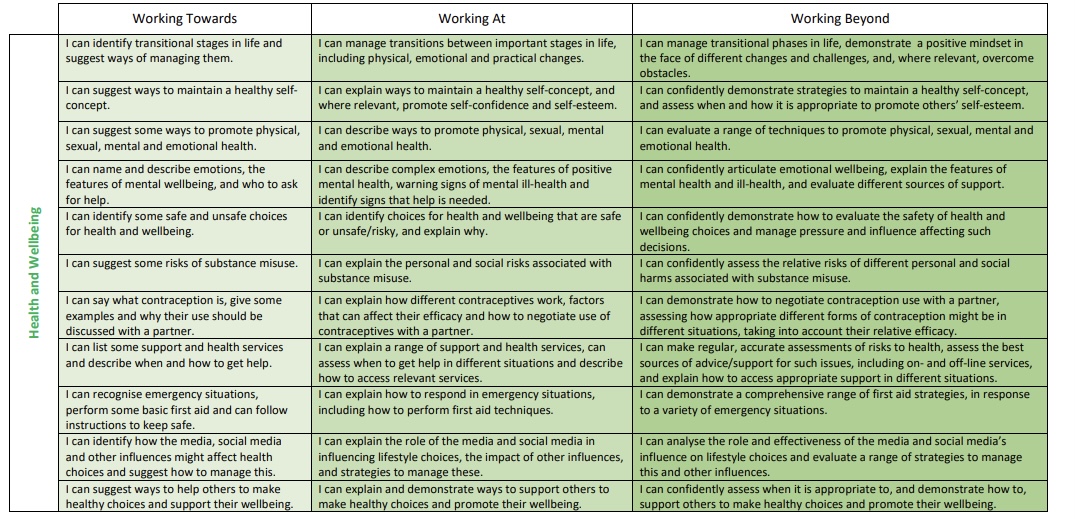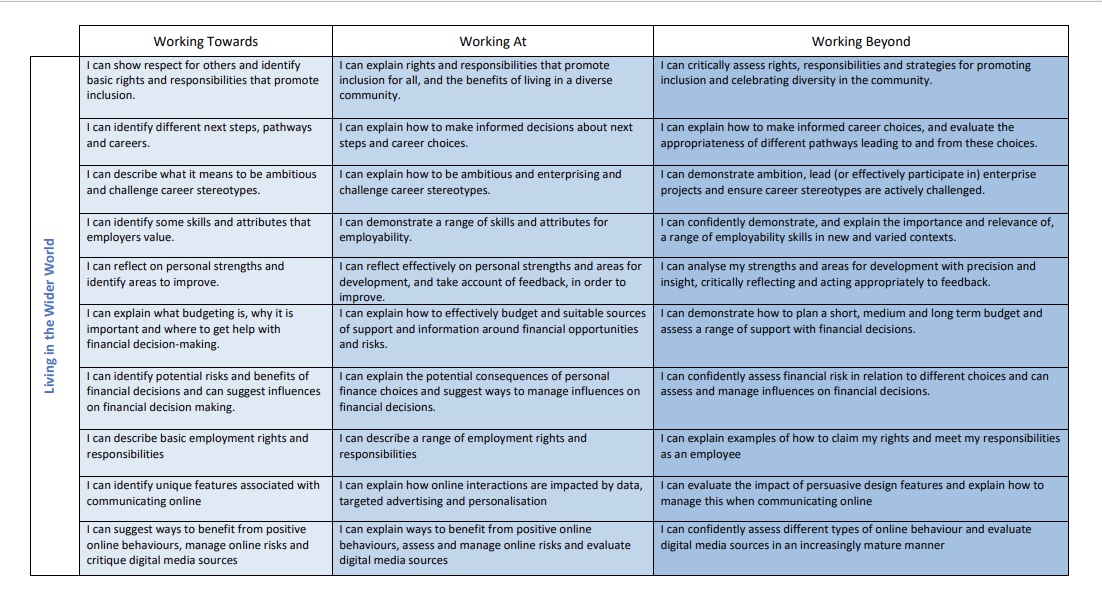
PSHE
William Ellis School strives to be an excellent school where students feel confident about their future. It aims to be a school where students:
- have ambition, work hard and make excellent progress
- have pride in their school and have high expectations for themselves and their peers
- believe that with their own effort, combined with learning, feedback and reflection they can get better
- are involved in their own learning and help drive school decisions
- feel safe, supported and respected for their individuality and know where to turn when in difficulty
- know their rights and their responsibilities and are prepared to be responsible, global citizens in a democratic society
- possess an informed understanding of the world of work and how wealth is created with an awareness of ethical behaviour, respect for the environment and social justice
- cultivate creative skills and an appreciation of art, music, drama and design
- develop an interest in the wider world and other cultures
- understand fair play and participate in healthy competition
Furthermore, at William Ellis school we want our students to be happy, kind and unique. We encourage students to appreciate each other and be polite and helpful young people. It is our intent, that within a modern, social culture, we will prepare WES students with the skills and resilience required to be a confident and responsible citizen. Furthermore, we want our students to gain knowledge and develop skills to live healthy and safe lives, respecting others and striving to make positive and healthy relationships with others. Alongside parents, we will aim to nurture the development of personal aspirations and to recognise their goals and potentials in life. By providing a safe environment for WES students, we will also encourage WES students to take risks and not be afraid of failure or mistakes; instead, celebrating the learning they can take from these ‘setbacks. Students mental health is of paramount importance to us, and we want WES students, parents, and carers to know where and how to access appropriate help.
At William Ellis School, our well-planned PSHE curriculum is designed to equip all our boys for the real world and to meet all of our pupils’ needs. We want our children to have high aspirations; a strong belief in themselves and to realise that anything is possible if they put their mind to it:
Implementation:
Our PSHE curriculum builds on prior learning by following the progressive frameworks outlined and quality assured by the PSHE Association.
This scheme of work has been amended and adapted to ensure that it meets the needs of all of our boys at William Ellis. It has been timetabled carefully, so that it links to national events, and provides further opportunities to enhance learner behaviour and culture at WES.
Although regular time-tabled sessions will be a necessity, PSHE must also be taught incidentally, and teachers are flexible and respond to students needs and current world affairs. Our School values and Celebration Assemblies which promote our values will also support the teaching of PSHE across the school.
It is also important that PSHE is supported in other areas of the curriculum, not just as a discrete lesson. At William Ellis we aim to promote and reflect British Values in all that we do. We pride ourselves on a whole school approach to promoting the spiritual, moral, cultural and social development of our pupils.
In 2022 the student council led Deep Learning Days around diversity, tolerance and LGBTQ awareness.
In 2023 we are planning Deep Learning Days with the “British Values Foundation” and “Arsenal FC”, building upon diversity, prejudice, discrimination, positive relationships and personal values.


Programme of study:
Boys at William Ellis have 1 hour of discrete PSHE lessons every two weeks, as well as additional whole school opportunities to enhance learning through other subjects, assemblies, events and positive interactions with adults and peers. PSHE at William Ellis is Thematic, and quality assured by the PSHE Association and Camden Learning.
The thematic approach to secondary PSHE education, covering all three core themes of the Programme of Study (Health and Wellbeing; Relationships; and Living in the Wider World) over six half terms.
The William Ellis PSHE programme of study is designed in such a way that all year groups are working on the same core theme at the same time. The PSHE content is carefully selected to ensure students have the opportunities to develop knowledge, skills and attributes, through a PSHE programme that is relevant and appropriate to the ethos of William Ellis school and the needs of our students.

The overview above outlines our PSHE content for each year group, for each half term. This is then followed by more detailed grids for each year group, setting out broad learning objectives for each half term block and a list of regularly updated links to relevant PSHE Association lessons and other resources that have gained the Quality Assurance Mark from the PSHE Association.
Furthermore, the thematic model shows clear progress through each of the Key Stages and enables us as a school community to focus further on Whole School “big picture” topics, and to support students to find their PSHE voice.
COVERING THE STATUTORY CONTENT
Although the PSHE programme at William Ellis organises content under different headings from those used in the content grids of the Department for Education’s statutory guidance on Relationships Education, RSE and Health education, it covers all of the statutory requirements for their phase, within a comprehensive PSHE programme.
Assessment in PSHE:
To support students in PSHE we use student-led assessments, so that by the end of each module students can self-assess and reflect on their progress and decide with peers and teachers whether they are “working towards”, “Working at”, or “working beyond”. We believe at WES this helps students to understand further the significance of PSHE in Health and Well Being, Living in the Wider World and Relationships.



Impact
The impact of our curriculum will not only be seen in boys work but by looking at the type of people our boys become. Our Boys will become confident, tolerant, independent and well-rounded individuals who are prepared for life and for their next steps. We want our Boys to be able to approach a range of real -life situations with confidence and to apply their skills when navigating themselves through modern life.
The impact of PSHE lessons will be measured by:
- Looking at evidence of boy’s work in class and books
- Student voice
- Self-assessment
- Looking at achievements of boys both in and outside of school
- Celebration assemblies – how has the behaviour/learning behaviour improved? What have they achieved this year that they have struggled with before?
- How children apply their PSHE skills in other subjects and situations they are faced with.
Relationships Education, Relationships and Sex Education, and Health Education in England
From 2020, Relationships Education will be compulsory in all primary schools in England and Relationships and Sex Education (RSE) will be compulsory in all secondary schools.
Health Education will be compulsory in all state funded schools. Personal, Social, Health and Economic Education (PSHE) continues to be compulsory in independent schools.
This is in response to the identified risks children and young people may face through their increased online activities and the need to support them to be safe and healthy, and manage their academic, personal and social lives in a positive way.
Following a consultation with parents, young people and professionals the DfE has published statutory guidance for Relationships Education, Relationships and Sex Education, and Health Education in England (DfE, 2019a).
If you would like to support any aspect of PSHE at William Ellis, or want to know more details about the thematic approach and the PSHE journey please email or call us, and find your PSHE voice.
